More solar storms striking Earth could lead to a dramatic rise in heart attacks, according to concerning new data on disturbances to the planet’s magnetic field.
Researchers from the National Institute for Space Research (INPE) in Brazil found that women had nearly three times more heart attacks on days when geomagnetic storms struck the planet’s invisible shield.
Earth’s magnetic field is created by the movement of molten iron and nickel in the planet’s core.
It protects us from harmful solar radiation and helps guide animals like birds during migration.
The new study found solar activity can impact the heart by disrupting the body’s natural rhythms and stress systems.
Geomagnetic storms change extremely low-frequency signals in the magnetic field that could affect brain waves, throwing off the balance of hormones like melatonin and serotonin.
These hormones help regulate blood pressure, heart function, and other vital processes that could lead to heart issues if the balance is upset.
INPE researcher Luiz Felipe Campos de Rezende said: ‘It’s worth noting that the number of heart attacks among men is almost twice as high – regardless of geomagnetic conditions.’

Earth’s magnetic field acts like an invisible shield which blocks out radiation and other harmful particles from space (Stock Image)

Women between 31 and 60 were found to be at the highest risk for heart attacks on days where the Earth’s magnetic field is disrupted by the sun (Stock Image)
Solar activity includes all the natural changes and events that take place in and around the sun, such as bursts of energy and particles that can affect Earth.
These bursts are caused by the sun’s own processes, such as the movement of its hot gases and magnetic fields, which can lead to explosions on the star’s surface.
Solar flares and coronal mass ejections (CMEs) release charged particles into space, and when these particles reach Earth, they can create disruptions in the planet’s magnetic field that can cause blackouts and impact satellite communications.
Think of these storms like a ripple effect above the planet, causing the planet’s shield to shake or compress.
When it comes to how that solar activity impacts human health, the Brazilian team found women over the age of 31 were more vulnerable to geomagnetic changes.
Specifically, those between 31 and 60 were particularly sensitive to these solar storms, suffering three times as many heart attacks on days with magnetic disruptions.
Besides heart attack risks, increased solar activity can pose other health dangers, including exposing all humans to excessive ultraviolet (UV) radiation, which can cause skin cancer or eye damage.
Solar particles can also affect the ionosphere, a layer of the Earth’s atmosphere high up where charged particles from the sun can cause changes, potentially influencing weather patterns and indirectly impacting people’s breathing, especially if they have asthma.

Solar storms striking the Earth come from coronal mass ejections and solar flares sent out by the sun days prior (Stock Image)
‘Scientists around the world have been trying to predict the occurrence of geomagnetic disturbances, but the accuracy, for now, isn’t good,’ Rezende told Agência FAPESP.
Their research was published in the journal Nature Communications Medicine.
NASA has already warned that our sun has unexpectedly begun to ramp up its activity.
This could lead to more severe solar storms that cause widespread blackouts and disrupt global communications.
NASA revealed that our solar system’s home star had been getting quieter and weaker for about 20 years, but that surprisingly changed in 2008 and scientists are still trying to figure out why.
Since 2008, the sun’s solar wind, which are streams of charged particles, has grown stronger, with increases in speed, density, temperature, and magnetic field strength.
The new study, conducted in Brazil from 1998 to 2005, analyzed hospital records of 1,340 people (871 men and 469 women) and found that heart attack rates increased during periods of disturbed magnetic conditions, with women suffering the strongest impact.
This article was originally published by a www.dailymail.co.uk . Read the Original article here. .

